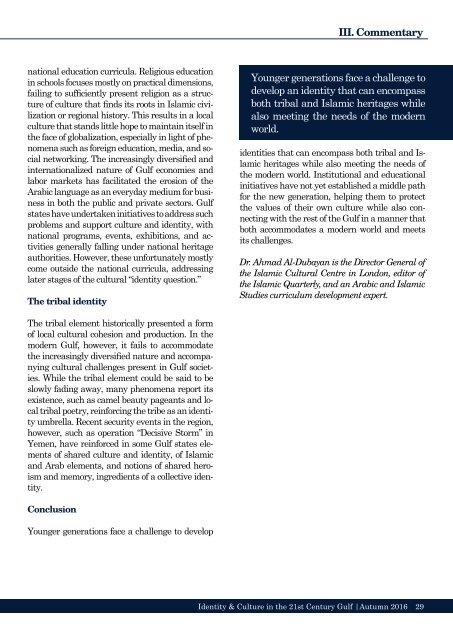You also want an ePaper? Increase the reach of your titles
YUMPU automatically turns print PDFs into web optimized ePapers that Google loves.
III. Commentary<br />
national education curricula. Religious education<br />
in schools focuses mostly on practical dimensions,<br />
failing to sufficiently present religion as a structure<br />
of culture that finds its roots in Islamic civilization<br />
or regional history. This results in a local<br />
culture that stands little hope to maintain itself in<br />
the face of globalization, especially in light of phenomena<br />
such as foreign education, media, and social<br />
networking. The increasingly diversified and<br />
internationalized nature of Gulf economies and<br />
labor markets has facilitated the erosion of the<br />
Arabic language as an everyday medium for business<br />
in both the public and private sectors. Gulf<br />
states have undertaken initiatives to address such<br />
problems and support culture and identity, with<br />
national programs, events, exhibitions, and activities<br />
generally falling under national heritage<br />
authorities. However, these unfortunately mostly<br />
come outside the national curricula, addressing<br />
later stages of the cultural “identity question.”<br />
The tribal identity<br />
Younger generations face a challenge to<br />
develop an identity that can encompass<br />
both tribal and Islamic heritages while<br />
also meeting the needs of the modern<br />
world.<br />
identities that can encompass both tribal and Islamic<br />
heritages while also meeting the needs of<br />
the modern world. Institutional and educational<br />
initiatives have not yet established a middle path<br />
for the new generation, helping them to protect<br />
the values of their own culture while also connecting<br />
with the rest of the Gulf in a manner that<br />
both accommodates a modern world and meets<br />
its challenges.<br />
Dr. Ahmad Al-Dubayan is the Director General of<br />
the Islamic Cultural Centre in London, editor of<br />
the Islamic Quarterly, and an Arabic and Islamic<br />
Studies curriculum development expert.<br />
The tribal element historically presented a form<br />
of local cultural cohesion and production. In the<br />
modern Gulf, however, it fails to accommodate<br />
the increasingly diversified nature and accompanying<br />
cultural challenges present in Gulf societies.<br />
While the tribal element could be said to be<br />
slowly fading away, many phenomena report its<br />
existence, such as camel beauty pageants and local<br />
tribal poetry, reinforcing the tribe as an identity<br />
umbrella. Recent security events in the region,<br />
however, such as operation “Decisive Storm” in<br />
Yemen, have reinforced in some Gulf states elements<br />
of shared culture and identity, of Islamic<br />
and Arab elements, and notions of shared heroism<br />
and memory, ingredients of a collective identity.<br />
Conclusion<br />
Younger generations face a challenge to develop<br />
<strong>Identity</strong> & <strong>Culture</strong> in the 21st Century Gulf |Autumn 2016 29


